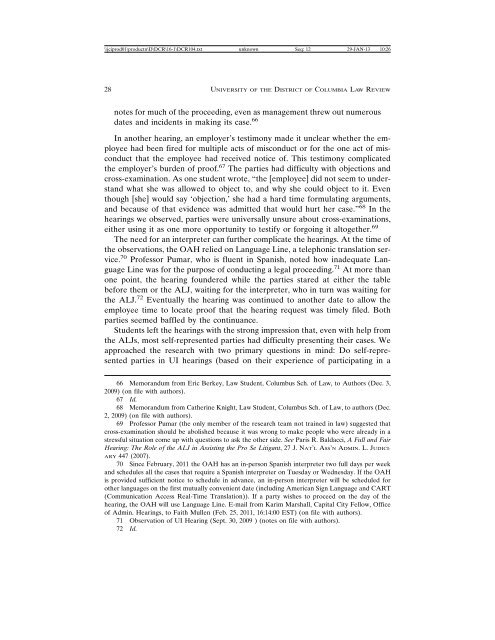volume 16, number 1 - UDC Law Review
volume 16, number 1 - UDC Law Review
volume 16, number 1 - UDC Law Review
- No tags were found...
You also want an ePaper? Increase the reach of your titles
YUMPU automatically turns print PDFs into web optimized ePapers that Google loves.
\\jciprod01\productn\D\DCR\<strong>16</strong>-1\DCR104.txt unknown Seq: 12 29-JAN-13 10:2628 UNIVERSITY OF THE DISTRICT OF COLUMBIA LAW REVIEWnotes for much of the proceeding, even as management threw out numerousdates and incidents in making its case. 66In another hearing, an employer’s testimony made it unclear whether the employeehad been fired for multiple acts of misconduct or for the one act of misconductthat the employee had received notice of. This testimony complicatedthe employer’s burden of proof. 67 The parties had difficulty with objections andcross-examination. As one student wrote, “the [employee] did not seem to understandwhat she was allowed to object to, and why she could object to it. Eventhough [she] would say ‘objection,’ she had a hard time formulating arguments,and because of that evidence was admitted that would hurt her case.” 68 In thehearings we observed, parties were universally unsure about cross-examinations,either using it as one more opportunity to testify or forgoing it altogether. 69The need for an interpreter can further complicate the hearings. At the time ofthe observations, the OAH relied on Language Line, a telephonic translation service.70 Professor Pumar, who is fluent in Spanish, noted how inadequate LanguageLine was for the purpose of conducting a legal proceeding. 71 At more thanone point, the hearing foundered while the parties stared at either the tablebefore them or the ALJ, waiting for the interpreter, who in turn was waiting forthe ALJ. 72 Eventually the hearing was continued to another date to allow theemployee time to locate proof that the hearing request was timely filed. Bothparties seemed baffled by the continuance.Students left the hearings with the strong impression that, even with help fromthe ALJs, most self-represented parties had difficulty presenting their cases. Weapproached the research with two primary questions in mind: Do self-representedparties in UI hearings (based on their experience of participating in a66 Memorandum from Eric Berkey, <strong>Law</strong> Student, Columbus Sch. of <strong>Law</strong>, to Authors (Dec. 3,2009) (on file with authors).67 Id.68 Memorandum from Catherine Knight, <strong>Law</strong> Student, Columbus Sch. of <strong>Law</strong>, to authors (Dec.2, 2009) (on file with authors).69 Professor Pumar (the only member of the research team not trained in law) suggested thatcross-examination should be abolished because it was wrong to make people who were already in astressful situation come up with questions to ask the other side. See Paris R. Baldacci, A Full and FairHearing: The Role of the ALJ in Assisting the Pro Se Litigant, 27 J. NAT’L ASS’N ADMIN. L. JUDICI-ARY 447 (2007).70 Since February, 2011 the OAH has an in-person Spanish interpreter two full days per weekand schedules all the cases that require a Spanish interpreter on Tuesday or Wednesday. If the OAHis provided sufficient notice to schedule in advance, an in-person interpreter will be scheduled forother languages on the first mutually convenient date (including American Sign Language and CART(Communication Access Real-Time Translation)). If a party wishes to proceed on the day of thehearing, the OAH will use Language Line. E-mail from Karim Marshall, Capital City Fellow, Officeof Admin. Hearings, to Faith Mullen (Feb. 25, 2011, <strong>16</strong>:14:00 EST) (on file with authors).71 Observation of UI Hearing (Sept. 30, 2009 ) (notes on file with authors).72 Id.














